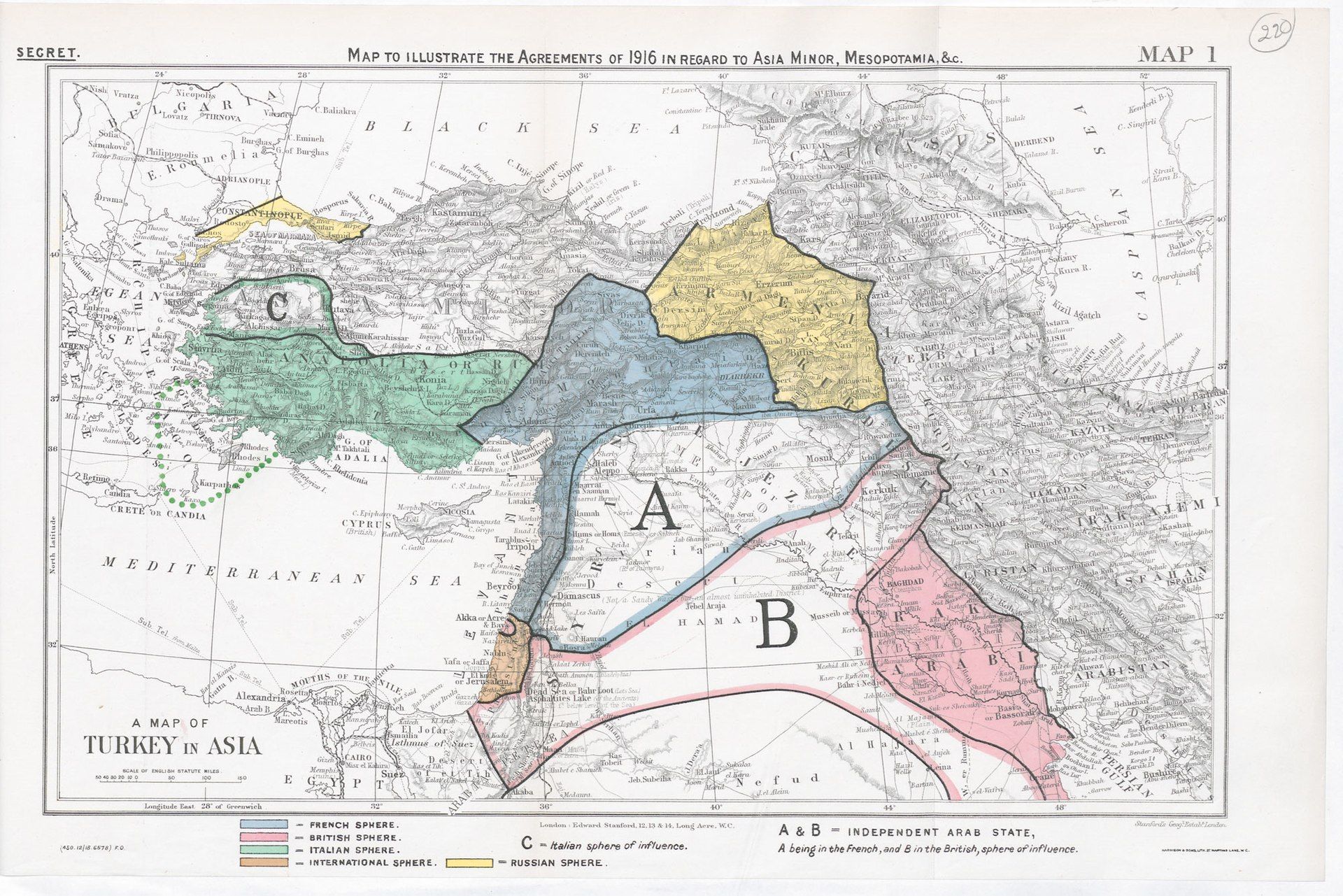The Colonial Playbook
How colonizers set things in motion that they don't care to consider.

In between the Dead Sea and the Mediterranean Sea there is a small strip of land that holds a special place in the hearts of Christians, Muslims, and Jews. Being the only part of the Middle East with no oil to fight over you might wonder why it is so hotly contested. This is one of the most complex issues in world politics right now and despite many solutions being proposed in the past none have come to fruition. For what it is worth my opinion is that it is unethical for Israel to slowly annex Palestine and that a two-state solution would be much fairer for the Palestinians. But my opinion on a matter like this does not count for much. Instead, I thought I would write about the peculiar events after WW1 that set all of this in motion and how colonial powers have a knack for creating division in society that stays long after they are gone. The British Mandate for Palestine was one of these many botched colonial disengagements at the end of Ye Old British Empire characterized by colonialists accentuating and often creating ethnic, religious, and cultural divisions within the population. Palestinians are just one of many peoples that have suffered at the hands of careless colonial statesmen and the pattern of chaos ensuing after imperialist powers have left is very common be it in Rwanda, India or anywhere else.
But before all that let's just briefly recap what actually happened around 1918 and how the situation was set up for failure to begin with. During WW1 Palestine and the land now called Israel was under Ottoman rule and after their dissolution in WW1 the League of Nations (the UN before it was cool) handed administrative power of this land over to Britain in what was called the British Mandate for Palestine. At this time the people that lived there were Arab Palestinians and a small community of Jews. In the time between WW1 and WW2 there was growing persecution of Jews around the world culminating in the Holocaust. Even the staunchest supporter of Palestine would agree that given the situation it was fair for Jews to want a new home that was on their own land. As the war continued and more and more Jews began to seek asylum in Western Europe and America, Britain decided that they too support a sovereign Jewish land and officially said so in a document called the Balfour Declaration. But where would they put this place? It sure can't be somewhere in Britain, Churchill probably thought to himself as he refused asylum to Jews fleeing the Nazi War Machine. So Britain decided to give Palestine away as this new Jewish country. Now if you're thinking - what the hell, why did they do that, so many Arab Palestinians already live there, where do they go, then you have more sense than a post war British Politician.
So put yourself in Post War Britain’s shoes after WW1. You're wounded, bleeding money everywhere and your colonies are becoming powerful. You're once unrivaled naval superiority has all but withered away and your strategic strongholds in the Middle East and Asia are weakened. The last thing you're thinking about is how to effectively and fairly divvy up land near Palestine. Add on the fact that the people in charge of all of this are known White Supremacists with a hierarchical view of race, and you've really got misaligned priorities. If you're thinking "oh my god what are you talking about Churchill was a war hero?!" This is him talking about the Palestinian disagreement with Jewish immigration... and more.
I do not admit that the dog in the manger has the final right to the manger, though he may have lain there for a very long time I do not admit that right. I do not admit for instance that a great wrong has been done to the Red Indians of America or the black people of Australia. I do not admit that a wrong has been to those people by the fact that a stronger race, a higher-grade race or at any rate a more worldly-wise race, to put it that way, has come in and taken their place. I do not admit it. I do not think the Red Indians had any right to say, 'American continent belongs to us and we are not going to have any of these European settlers coming in here'. They had not the right, nor had they the power." - Churchill
The reason Britain had declared their support for a sovereign Jewish land - in the famous Balfour Declaration - was in part due to lobbying from extremely conservative and wealthy Jews that considered themselves as Zionists. Now today "Zionist" is a very prickly word, but it represents a Jewish fundamentalist ideology that if all the Jews go back to their ancestral homeland "Canaan" and live there as farmers then God will save them. Of course, there are many different ways to practice Judaism but unfortunately the only representation at the time of Israel’s founding was Zionism. It is very easy for a party that supports imperialism and cultural segregation to hand power over to another party that feels much the same way. Even many Jews opposed the formation of Israel back in 1918. As many Jews are secular they wanted a state for Jews and not a Jewish State.
As time went on and more of the Jewish diaspora reached the newly carved land in Palestine and Transjordania the existing Palestinians felt like they weren't being listened too. After all many of these “Treaties” and “Declarations” were written without a single Palestinian opinion. Instead, the Arab parties involved were King's and Emir's in the region that Britain involved for bargaining power. They wanted a couple of things:
- They wanted the Arab Kings to fully support the new Jewish State.
- They wanted their men alongside them in a war against the Ottoman Empire.
As you can tell the incentives that the colonialists had were completely different from the people that lived in the region. The things they wanted were different, the time horizon over which they wanted it was different and what they were willing to give up was different. This is true for pretty much any country that has been colonized.
Divide and conquer was a very common play that colonialists would run. Whatever small divide, be it racial/religious/ethnic/cultural, they could find in a group of people they would accentuate it and give one group immense power over the other. It is true that this tactic works great for gaining and maintaining power in a region but that misses its greatest benefit. When you leave a region you can leave it in shambles, guaranteeing that there is no coordinated and retaliatory force against you. You can ensure that the people are so caught up with "us vs. them" issues internally that sometimes they even look back at your involvement as a positive. In Rwanda, Belgian colonizers essentially manufactured the Hutu and Tutsi ethnicities that once coexisted and then forcibly separated, indoctrinated, and maltreated them. After the colonizers had satisfactorily pillaged and enslaved the whole populace and decided to leave, the only thing that was left was ethnic blood hatred and a horrific genocide ensued.
India is the birthplace of thousands of religions and a place where even more are practiced. It's common for people to speak four languages and understand two more. It's a place of immense plurality and this is evidenced in the cultural history dating back several thousands of years. And if you haven’t read about all that surely the diversity of cuisine in India gives you some impression of how many different kinds of people live there… of course that is only if you can look past butter chicken. The ridiculous plan to split the nation in two on a religious basis is something that Indians, Pakistanis and Bangladeshi’s will never recover from. You might be under the impression that Hindus and Muslims have hated each other forever but this isn't the case at all. For generations Hindus, Muslims and every other religion in India coexisted. They did so under the rule of different kingdoms and principalities and also during the Mughal era (this is a dicey topic that’s beyond the scope of this piece). In 1857, during the early stages of British colonialism in the subcontinent there was a joined rebellion against the British East India Trading Company. Both Hindus and Muslims fought side by side in a major, but unfortunately unsuccessful, attack against incumbent colonialists in the famous “Great Mutiny”. By the way you don’t get any prizes for guessing which side named these events. Cultural and national identity was more important to the “mutineers” than their religious one. In response to this the British decided it would be easier to fend off many weak opponents who were always bickering with each other rather than one large and united one. As such the Divide and Rule policy was started and for 100 years the colonialists segregated and propagandized the Indian population with the express focus of increasing polarization and animosity on a religious basis. When Independence was finally on the table almost a hundred years of leg work had been done by the British to split India in two.
All these atrocious colonial departures are not an excuse to exploit the position you’re left in to do bad things in the modern day. Countries like Israel should show compassion instead trying to leverage their position of power. But I think it's worth being aware of what key events set things in motion to bring us here. It's a sad realization that the racist and capricious statesmen involved in these decisions couldn't even think more than a week ahead and yet their actions would have consequences centuries later. Unity and cooperation are our natural state, as a species we would not have come this far if this wasn't the case. It is only when you add divisive politics, ridiculous religious views and other non-rational ways of thinking like race theory that people turn to exploitation en masse.

